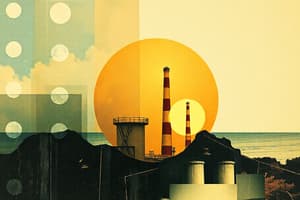Podcast
Questions and Answers
Which activity primarily enhances cultural immersion during travel?
Which activity primarily enhances cultural immersion during travel?
- Lying on the beach all day
- Meeting the locals (correct)
- Buying souvenirs
- Visiting famous landmarks
A traveler wants to gain a deeper understanding of a destination's history and artistic achievements. Which of the following activities is most suitable?
A traveler wants to gain a deeper understanding of a destination's history and artistic achievements. Which of the following activities is most suitable?
- Practicing the language
- Going on guided tours
- Exploring nature
- Visiting museums (correct)
If a traveler seeks a balance between structured learning and personal exploration, which combination of activities would be most effective?
If a traveler seeks a balance between structured learning and personal exploration, which combination of activities would be most effective?
- Trying the local cuisine and practicing the language
- Meeting the locals and lying on the beach all day
- Visiting museums and buying souvenirs
- Going on guided tours and having time to yourself (correct)
Which activity allows tourists to engage with local commerce and sample regional products?
Which activity allows tourists to engage with local commerce and sample regional products?
A traveler wants to experience the authentic flavors of a region. Which activity would best cater to this interest?
A traveler wants to experience the authentic flavors of a region. Which activity would best cater to this interest?
For a traveler interested in improving their communication skills while abroad, which activity is most beneficial?
For a traveler interested in improving their communication skills while abroad, which activity is most beneficial?
Which activity combines relaxation with experiencing the natural environment?
Which activity combines relaxation with experiencing the natural environment?
If a traveler desires a structured learning experience about a new place, alongside opportunities to see key attractions, which activity is most appropriate?
If a traveler desires a structured learning experience about a new place, alongside opportunities to see key attractions, which activity is most appropriate?
Which activity provides opportunities for solitude and reflection during a trip?
Which activity provides opportunities for solitude and reflection during a trip?
A traveler is looking to connect with the community and support local artisans. Which two activities would best achieve this?
A traveler is looking to connect with the community and support local artisans. Which two activities would best achieve this?
If a traveler is interested in both the natural beauty and the preservation of ecosystems in an area, which activity aligns with these interests?
If a traveler is interested in both the natural beauty and the preservation of ecosystems in an area, which activity aligns with these interests?
Which of these tourist activities focuses on the tangible memories of a trip?
Which of these tourist activities focuses on the tangible memories of a trip?
A traveler with limited time wants to quickly grasp the essential facts and stories about a historical site. Which activity is most suitable?
A traveler with limited time wants to quickly grasp the essential facts and stories about a historical site. Which activity is most suitable?
If the goal is to delve into the historical significance and cultural heritage of a site, which activity is the best?
If the goal is to delve into the historical significance and cultural heritage of a site, which activity is the best?
Which activity provides the least structured experience, allowing for spontaneity?
Which activity provides the least structured experience, allowing for spontaneity?
Which of the following combines cultural exchange with practical application?
Which of the following combines cultural exchange with practical application?
Which activity would NOT contribute to a deeper understanding of local culture?
Which activity would NOT contribute to a deeper understanding of local culture?
If a traveler wants to directly support the local economy and also acquire unique, handcrafted goods, which activity is most appropriate?
If a traveler wants to directly support the local economy and also acquire unique, handcrafted goods, which activity is most appropriate?
Which activity most directly facilitates sensory appreciation of a destination?
Which activity most directly facilitates sensory appreciation of a destination?
A traveler wants to experience the environment through active exploration. What aligns with this?
A traveler wants to experience the environment through active exploration. What aligns with this?
Flashcards
Meet the locals
Meet the locals
Engage with people who live in the area.
See famous landmarks
See famous landmarks
See well-known attractions and significant sites.
Have time to yourself
Have time to yourself
Take personal time for relaxation and reflection.
Buy souvenirs
Buy souvenirs
Signup and view all the flashcards
Try the local cuisine
Try the local cuisine
Signup and view all the flashcards
Practise the language
Practise the language
Signup and view all the flashcards
Visit museums
Visit museums
Signup and view all the flashcards
Visit local markets
Visit local markets
Signup and view all the flashcards
Lie on the beach all day
Lie on the beach all day
Signup and view all the flashcards
Explore nature
Explore nature
Signup and view all the flashcards
Go on guided tours
Go on guided tours
Signup and view all the flashcards
Study Notes
Gas Properties
- Gases exhibit high compressibility and thermal expansion
- Gases have low viscosity and density
- Gases are miscible
Gas Pressure
- Gases exert pressure, defined as force per unit area
- Pascals (Pa), atmospheres (atm), torr, and mm Hg are common pressure units
- Barometers and manometers are tools used to measure pressure
Boyle's Law
- For a fixed amount of gas at constant temperature, pressure and volume are inversely proportional
- $P_1V_1 = P_2V_2$
Charles's Law
- For a fixed amount of gas at constant pressure, volume and temperature are directly proportional
- $\frac{V_1}{T_1} = \frac{V_2}{T_2}$
Avogadro's Law
- For gases at the same temperature and pressure, volume and the number of moles are directly proportional
- $\frac{V_1}{n_1} = \frac{V_2}{n_2}$
Ideal Gas Law
- Relates pressure, volume, temperature, and the number of moles of a gas
- $PV = nRT$
- $P$ = pressure
- $V$ = volume
- $n$ = number of moles
- $R$ = ideal gas constant ($0.0821 \frac{L \cdot atm}{mol \cdot K}$ or $8.314 \frac{J}{mol \cdot K}$)
- $T$ = temperature in Kelvin
- Standard Temperature and Pressure (STP) is 273.15 K (0°C) and 1 atm
Gas Mixtures and Partial Pressures
- Dalton's Law states that the total pressure in a gas mixture is the sum of the partial pressures of each gas
- $P_{total} = P_1 + P_2 +... + P_n$
- The partial pressure of a gas is related to its mole fraction
- $P_i = X_i P_{total}$
- $X_i$ is the mole fraction of gas $i$
Kinetic Molecular Theory of Gases
- This theory describes gases as particles in constant, random motion
- The average kinetic energy of gas particles is proportional to the absolute temperature
- $KE_{avg} = \frac{3}{2}RT$
Gas Stoichiometry
- The ideal gas law can relate gas volume to the number of moles in stoichiometric calculations
Real Gases
- Real gases deviate from ideal behavior at high pressures and low temperatures
- Deviations are due to gas particle volume and intermolecular forces
- The van der Waals equation accounts for these deviations
- $(P + a(\frac{n}{V})^2)(V - nb) = nRT$
- $a$ and $b$ are van der Waals constants specific to each gas
Studying That Suits You
Use AI to generate personalized quizzes and flashcards to suit your learning preferences.




